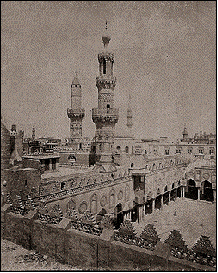 W
WReligion in Egypt controls many aspects of social life and is endorsed by law. The state religion of Egypt is Islam. Although estimates vary greatly in the absence of official statistics. Since the 2006 census religion has been excluded, and thus available statistics are estimates made by religious and non-governmental agencies. The country is majority Sunni Muslim, with the next largest religious group being Coptic Orthodox Christians. The exact numbers are subject to controversy, with Christians alleging that they have been systemically under-counted in existing censuses.
 W
WThe Ministry of Awqaf of Egypt is one of ministries in the Egyptian government and is in charge of religious endowments. Religious endowments, awqaf, are similar to common law trusts where the trustee is the mosque or individual in charge of the waqf and the beneficiary is usually the community as a whole. Examples of waqfs are of a plot of land, a market, a hospital, or any other building that would aid the community.
 W
WThe Baháʼí Faith in Egypt has existed for over 100 years. The first followers of the Baháʼí Faith arrived in Egypt in 1863. Baháʼu'lláh, founder of the religion, was himself briefly in Egypt in 1868 when on his way to imprisonment in ʻAkká. The first Egyptians were converts by 1896. Despite forming an early Baháʼí Local Spiritual Assembly and forming a National Assembly, in 1960 following a regime change the Baháʼís lost all rights as an organised religious community by Decree 263 at the decree of then-President Gamal Abdel Nasser. However, in 1963, there were still seven organized communities in Egypt. More recently the roughly 2000 or 7000 by ARDA Baháʼís of Egypt have been embroiled in the Egyptian identification card controversy from 2006 through 2009. There have been homes burned down and families driven out of towns.
 W
WIrreligion in Egypt is controversial due to the largely conservative nature of the country. It is difficult to quantify the number of atheists or agnostics in Egypt, as the stigma attached to being one makes it hard for irreligious Egyptians to publicly profess their views and beliefs. Furthermore, public statements that can be deemed critical of Islam or Christianity can be tried under the country's notorious blasphemy law. Outspoken atheists, like Alber Saber, have been convicted under this law. These types of crime in Egypt hold a status similar to Antragsdelikt, legal proceedings only occur if a citizen takes the step of suing the person engaging in blasphemy, and cases are not initiated by the general prosecutor.
 W
WIslam is the dominant religion in Egypt with around an estimated 90.3% of the population. Almost the entirety of Egypt's Muslims are Sunnis, with a very small minority of Shia. The latter, however, are not recognized by Egypt. Islam has been recognized as the state religion since 1980. Since there has been no religious census, the actual percentage of Muslims is not known: the percentage of Christians are estimated to be between 10 and 15%.
 W
WIn a predominantly Muslim society, as many as 90% of women in Egypt have adopted a form of veiling. A majority of Egyptian women cover at least their hair with the hijab. A hijab refers to a head covering that is worn by Muslim women. Although the phenomenon of wearing the niqāb, a veil which covers the face is not as common, the niqab in Egypt has become more prevalent. While a few women in Egypt wear a black niqab along with a billowing black abaya as seen in countries such as Saudi Arabia, many choose to wear different colors of the niqab or manipulate the hijab to cover their face. Regardless, the growing trend of munaqqabat, or women who wear the niqab, has alarmed the authorities. They have begun to see this dress as a security threat, because it hides the face, and because it is perceived as a political statement, a rejection of the state in favor of a strict Islamic system.
 W
WIn the cultures of the Horn of Africa and adjacent regions of the Middle East, Zār is the term for a demon or spirit assumed to possess individuals, mostly women, and to cause discomfort or illness. The so-called zār ritual or zār cult is the practice of exorcising such spirits from the possessed individual.